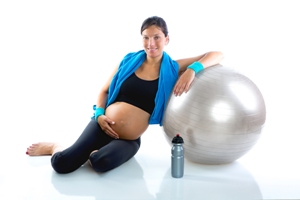When you become pregnant, weight gain will be an issue on everyone’s mind. Doctors are concerned about how much you gain and lose due to the health of the baby. However, you will want to care about your health and exercise because it will make your labor and delivery easier. It will also help you lose weight in the postpartum months.
It is also very important that you know how to work out safely. While it is important to work out, it is also very important that you do not jeopardize the health of your fetus. There are different guidelines depending on what trimester of the pregnancy you are in.
First Trimester
If you start working out during your first trimester, you will have fewer problems keeping up a routine later in your pregnancy. Pregnancy risk factors can be reduced if you maintain your health. Some women even see relief from morning sickness and fatigue.
Exercise also reduces the stress you are putting on your body throughout the pregnancy. You will go through emotional, physical, and hormonal changes. It is recommended that you attempt to work out every other day for at least 30 minutes. Your infant also will receive the benefits of reduced stress. Researchers are beginning to notice that infants born to women who have maintained an exercise routine throughout the pregnancy are able to self-
This is also the time to find out if exercise is safe for your pregnancy. Contact sports, skating, skiing, or other dangerous sport should be avoided. Running, walking, yoga, swimming, biking, and other low-
Second Trimester
Exercise can still be continued during the second trimester. You are able to continue with weights and Cardio workouts. It is vital before you start any workout that you stretch. You have a greater chance of injuring yourself if you do not warm-
• Forward Pull Ups
• Forward lunges
• Squats
• Upright Row
• Shoulder Press
• Pectoral Lift
Third Trimester
During the third trimester, it will be very important to be in tune with your body. Exercise can prevent high blood pressure, gestational diabetes, and other weight gain problems. With your growing belly, you will need to adjust your routine to allow you to handle the change in body shape. Adapting the workout does not mean that you have to completely cut out activities. It does mean that you should watch out for
dizziness, pain, extra fatigue, or headaches. You should still utilize the birthing ball to do stretches and prenatal yoga is extremely beneficial. Kegel exercises should also be done regularly. Many women notice they are no longer are able to run or even walk at a brisk pace because of fatigue; however, anything is better than nothing is when it comes to exercise.
Exercising with Twins
If you are pregnant with multiples, exercise needs to be taken in a different light. You need to be monitored more closely, but exercise is still necessary to maintain optimum health. Your belly will get much larger, much faster, than a mother carrying a single baby, so there are some adaptations to take into account. It is strongly recommended that after week 28, you do not do more than walking or water aerobics as it can start pre-
• Swimming
• Aqua Aerobics
• Yoga
• Pilates
• Pelvic floor exercises
• Walking
As long as you do not feel like you extremely stressed, then you can continue. You can watch your health during the workout by monitoring your heart rate and contractions (or Braxton Hicks).
Stop Working Out
Whether you are carrying one child or multiple, you will need to watch out for the following symptoms. If you experience any one of them, you will need to stop your workout and talk to your doctor for further advice.
• Back pain or pain in your hips
• Leaking of fluid other than urine
• Vaginal bleeding
• Blurred vision
• Nausea and/or sickness
• Dizziness
• Fainting
• Breathlessness
• Heart palpitations
• Increased swelling in your hands, feet and ankles
• Sharp pain in your tummy or chest
• Calf pain or swelling
• Your baby is moving less than usual or not at all
• You feel unwell

